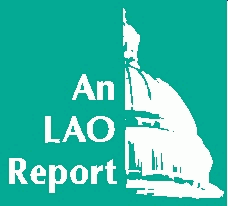
 |
The 1999-00 Budget Actand Related LegislationChapter 2 |
The 1999-00 Budget Act includes several tax relief provisions, as summarized in Figure 1 and discussed below. It is estimated that these provisions will have a General Fund impact of approximately $300 million in 1999-00. The adopted measures include a reduction in the vehicle license fee (VLF) (in addition to those approved last year), an increase in the deduction of health insurance premiums for self-employed individuals, and three tax-relief provisions targeted to business activity in the state.
| Figure 1 |
| Tax-Relief Measures Accompanying the
1999-00 Budget Act |
|
|
|
|
|
The adopted budget includes a one-time reduction in the VLF of 10 percent for calendar year 2000. This reduction is independent of the potential future reductions in the VLF approved in 1998 (discussed below).
The VLF is an annual fee on the ownership of a registered vehicle in California, levied in place of taxing vehicles as personal property. The revenues are distributed to cities and counties. As part of last year's budget, the VLF was permanently cut by 25 percent, with the potential of additional reductions in future years if specific revenue levels (or "triggers") are reached. The first such trigger would result in a cumulative 35 percent reduction beginning in 2001. The maximum reduction possible under the agreement would lower the VLF by a cumulative 67.5 percent, beginning in 2003. In order for any of these additional reductions to become permanent, the corresponding revenue triggers need to be reached in two consecutive years.
Under last year's agreement, cities and counties continue to receive the same amount of revenues as under prior law, with the reduced VLF amounts replaced by General Fund spending. The General Fund currently spends about $1 billion annually to backfill revenues to local governments associated with the initial 25 percent VLF reduction.
The adopted budget provides for an additional 10 percent VLF reductionfor a cumulative reduction of 35 percentin calendar year 2000 only. The estimated cost of this reduction is almost $500 million, spread across the 1999-00 and 2000-01 fiscal years.
This one-time reduction is independent of the previously enacted trigger provisions.
Thus, for the 35 percent reduction to continue beyond calendar year 2000, General Fund revenues would still need to reach the levels specified in last year's budget agreement. Specifically, if the first 35 percent trigger is reached in 2000-01, the new 10 percent reduction would continue in calendar year 2001, again as a temporary measure. Not until calendar year 2002 could the new 10 percent (and thus the cumulative 35 percent) reduction become permanent if the corresponding trigger is reached.
In addition, the budget agreement calls for the initial 25 percent VLF reduction (effective January 1, 1999) to apply to VLF paid in 1998 by commercial trucks doing business both inside and outside of California. This reduction will essentially act as a credit against amounts payable in the 1999 calendar year, and have an estimated one-time General Fund fiscal cost for 1999-00 of $12.5 million.
The budget agreement puts California in conformity with federal law regarding the personal income tax deduction allowed for the cost of health insurance premiums paid by the self-employed. Currently, California allows a deduction equal to 40 percent of the cost of health insurance premiums for self-employed individuals and their families. A similar federal program currently allows a 60 percent deduction for 1999 through 2001, a 70 percent deduction for 2002, and a 100 percent deduction beginning in 2003 and thereafter. The budget raises California's deductibility percentages to equal those of the federal program. The estimated revenue reductions are $21 million in 1999-00, rising to $83 million in 2003-04 and annually thereafter.
The budget removes the sunset provision for the partial income tax exclusion of capital gains on small business stock. Under current personal income tax law, individual and business taxpayers can exclude 50 percent of the capital gains on certain small business stock, provided the stock is held for five years or longer and was purchased prior to January 1, 1999. To qualify under the program, the stock must be issued by a corporation (1) with less than $50 million in assets, (2) active in certain trade or business activities, and (3) with 80 percent or more of its dollar payroll attributable to California. By eliminating the January 1, 1999 sunset date, the partial capital gains exclusion is now permanent.
This change would first affect revenues in 2003-04 (a $3 million reduction), increasing to $44 million in 2005-06.
Current law requires that corporations in California pay a minimum corporate franchise tax of $800 annually. Corporations with gross receipts of under $1 million, however, pay reduced amounts for the first two years of operation ($300 for the first year and $500 for the second year). The new budget eliminates the minimum corporate franchise tax for all new corporations for the first two years of operation, beginning January 1, 2000. This is expected to result in reduced revenues of $28 million in 1999-00 and approximately $60 million annually thereafter.
The budget provides for an increase in the income tax credit for qualified research and development expenditures. Under current law, a credit equaling 11 percent of increased research and development expenditures above a base amount is available to individuals and businesses. These expenditures must be technological in nature, relate to the development or production of a new or improved product, and be carried out in California. This provision permanently increases the standard tax credit to 12 percent of qualified expenditures, resulting in estimated revenue reductions of $5 million in 1999-00, rising to $9 million in 2002-03 and annually thereafter.
Return to California Spending Plan 1999-00 Table of Contents